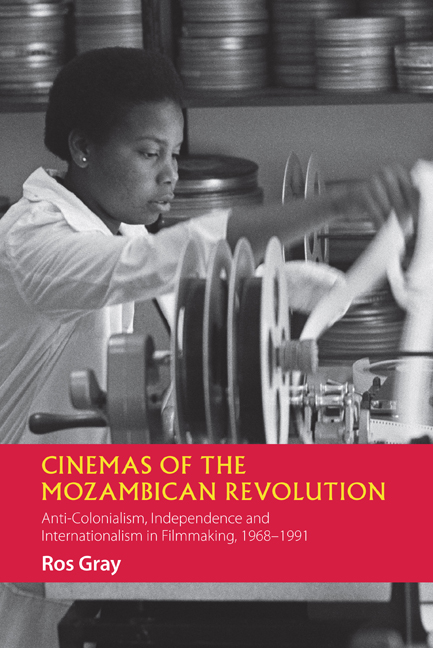 Cinemas of the Mozambican Revolution
Cinemas of the Mozambican Revolution Book contents
- Frontmatter
- Contents
- List of Images
- Acknowledgements
- Glossary
- Abbreviations
- Map of Mozambique
- Introduction
- 1 We Will Win! Filming the Armed Struggle in Mozambique, 1968–1973
- 2 From the Rovuma to the Maputo: Confluences of Independence, 1974–1975
- 3 Birth (of the Image) of a Nation: Delivering Cinema to the People, 1976–1978
- 4 Who Exactly is the Party? Didacticism, the Battle of Information and the Vanguard Party, 1977–1979
- 5 A New Symphony: Cinema and Television in the ‘Decade of Development’, 1980–1984
- 6 Let Them Come! Filmmaking on the Frontline against Apartheid, 1980–1989
- 7 The Time of the Leopards: The End of Socialist Fictions and the Beginnings of the Docu-Drama, 1985–1991
- Conclusion
- Bibliography
- Filmography
- Index
7 - The Time of the Leopards: The End of Socialist Fictions and the Beginnings of the Docu-Drama, 1985–1991
Published online by Cambridge University Press: 16 July 2020
- Frontmatter
- Contents
- List of Images
- Acknowledgements
- Glossary
- Abbreviations
- Map of Mozambique
- Introduction
- 1 We Will Win! Filming the Armed Struggle in Mozambique, 1968–1973
- 2 From the Rovuma to the Maputo: Confluences of Independence, 1974–1975
- 3 Birth (of the Image) of a Nation: Delivering Cinema to the People, 1976–1978
- 4 Who Exactly is the Party? Didacticism, the Battle of Information and the Vanguard Party, 1977–1979
- 5 A New Symphony: Cinema and Television in the ‘Decade of Development’, 1980–1984
- 6 Let Them Come! Filmmaking on the Frontline against Apartheid, 1980–1989
- 7 The Time of the Leopards: The End of Socialist Fictions and the Beginnings of the Docu-Drama, 1985–1991
- Conclusion
- Bibliography
- Filmography
- Index
Summary
In 1985, the INC's first fiction feature, O Tempo dos Leopardos ‘The Time of the Leopards’ (1985), was premiered in Maputo at a magnificent ceremony to celebrate ten years of independence. The film is a fictional account of the anti-colonial war that contributes to a mythic narrative about the founding of the nation through armed struggle and an idea of authentic Mozambican identity based on Frelimo's values of disciplined militancy and self-sacrifice for the good of o Povo. Zdravko Velimirović, the Yugoslav director of the film, was in attendance for the occasion. The film's stars – Santos Mulungo and Ana Magaia, who played the heroic couple Pedro and Ana – were invited to the reception after the projection, as was the other leading actor Simião Mazuze, who played the love rival and flawed Frelimo guerrilla Januario. In the years that followed, Velimirović recounted an incident at the reception that stayed with him: Samora Machel presented Mulungo with a gift of a pair of trainers and Magaia some fabric. When it came to Simião, however, the president berated him, asking how it was that he was not ashamed after everything he had done in the film and threatening to have him arrested as a traitor to Frelimo. Machel's strong sense of political theatre seems to have come to the fore in this blurring of art and life. It is telling that the most reviled character in the film was not one of the Portuguese colonisers, who are shown committing mass killings of civilians and torturing captured Frelimo guerrillas. Rather, the most dangerous character is embodied by the figure of the traitor – ‘the enemy within’.
It is worth recalling that the first film made with Frelimo, Dragutin Popović's Venceremos, was also both a production made with Yugoslavia and a response to fears of betrayal, motivated in part to assuage the concerns of Frelimo's foreign supporters following the assassination of Eduardo Mondlane in 1969 and the upheavals of discontent that had torn through the movement in the previous year (see Chapter 1). Venceremos and the other armed struggle films made in the early 1970s presented Frelimo as the only legitimate and authentic Mozambican liberation movement dedicated not just to ending colonial rule, but also to destroying the colonialist mentalities that threatened the emancipation of the Mozambican people.
- Type
- Chapter
- Information
- Cinemas of the Mozambican RevolutionAnti-Colonialism, Independence and Internationalism in Filmmaking, 1968–1991, pp. 235 - 254Publisher: Boydell & BrewerPrint publication year: 2020
